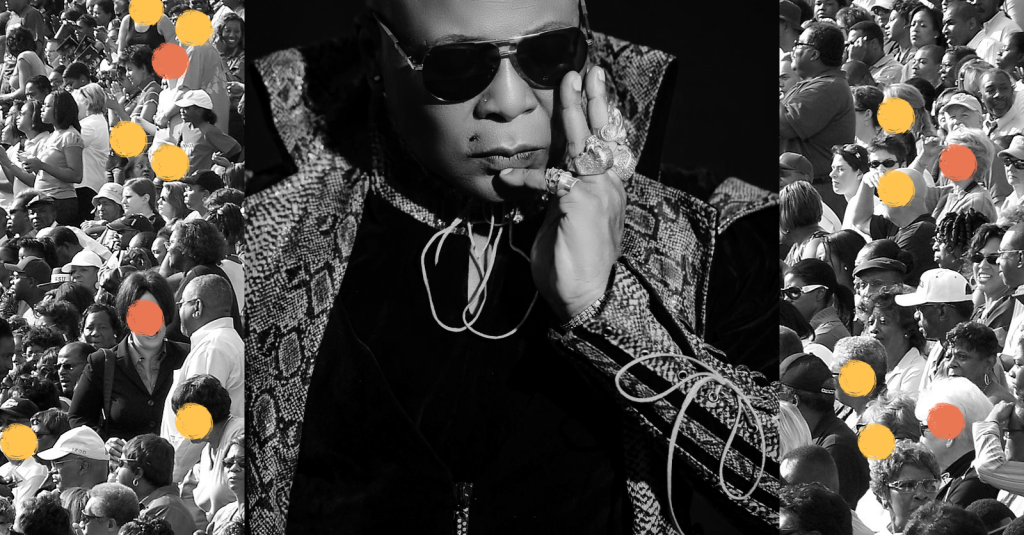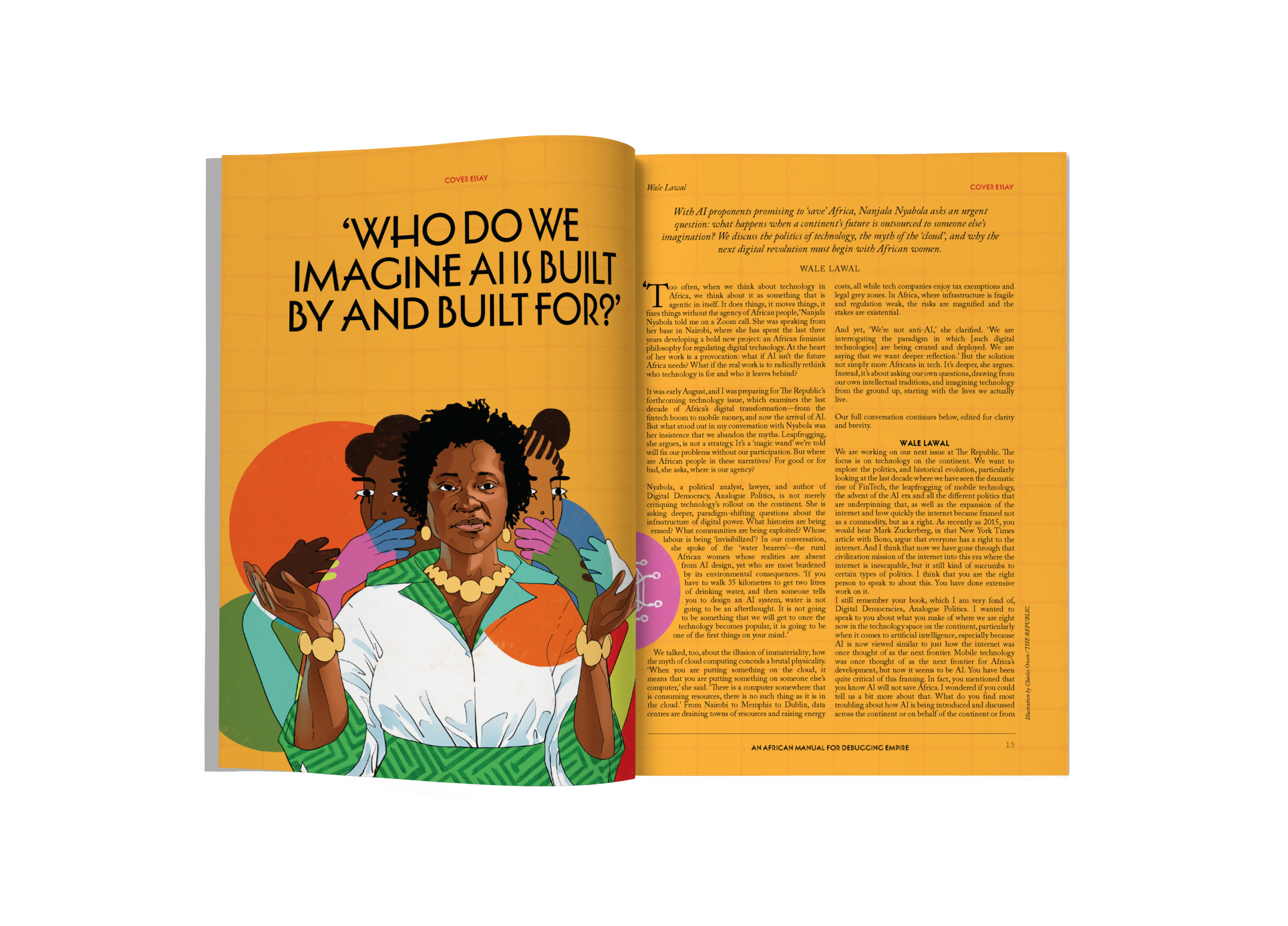
Photo Illustration by Ezinne Osueke / THE REPUBLIC. Source Ref: WIKIMEDIA.
THE MINISTRY OF CULTURAL AFFAIRS
Charly Boy Bus Stop and the Politics of Official Renaming

Photo Illustration by Ezinne Osueke / THE REPUBLIC. Source Ref: WIKIMEDIA.
THE MINISTRY OF CULTURAL AFFAIRS
Charly Boy Bus Stop and the Politics of Official Renaming
I came to know my name as Abiola. As I understood life, I began to wonder why Ijaw parents would call their son Abiola despite all the other Ijaw names. My mother recounted that I was born on June 13, a day after the historic 1993 election that had just been conducted. It was a celebration of the fame of Moshood Abiola, the late presidential candidate, and perhaps they wanted me to be like him. My childhood disputes primarily involved stopping others from calling me that name, especially as children all around nicknamed me ‘Abiola milk’. Now that I fully understand the origin of the name and its intent, I now proudly bear it even though it’s too late to add that to my certificates. I doubt even with amnesia, anyone could forget my birth date if they know this story.
The second story that will forever stay in my heart is about my two nieces. When my elder brother had two daughters and a third girl was born, I saw my elder brother and his wife visibly grieving. My mother named the baby ‘Erekpo-idisenimi’, meaning ‘even if it is a girl, I like it.’ The story continued with a fifth girl, whom she named ‘Ifiemi’, meaning ‘there is time.’ This goes beyond my personal stories; informal toponyms encode jokes, tragedies, market lore and family sagas that never make it into government gazettes or school textbooks.
Across Nigeria, directions are hardly ever neutral. Ask how to find an address in Aba or Kaduna and the answer will come wrapped in stories: One-Man Village got its name from a lone farmer who held out against urban sprawl; Hospital Junction marks the spot where a missionary clinic once stood when there were no government health posts; Coca-Cola Bus Stop recalls the first refrigerated kiosk in the district. Such labels are Nigeria’s grassroots encyclopaedia, created by residents, repeated by bus conductors and traders, and passed down like family heirlooms. Scholars call this kind of toponymy a living archive because it compresses local history into a word that everyone, literate or not, can recognize.
Nigeria’s literacy rate was about 69 per cent in 2023, and even among the literate, few possess home libraries or stable internet. Place names, therefore, serve as mnemonic pegs. They trigger stories at bus parks, barber shops and evening football viewings. If a junction is called War Front, someone will ask why, and an elder will recount how soldiers camped there during the Civil War. The answers transmit not just nostalgia but civic lessons: who organized the first borehole, which women’s cooperative fought for a market stall, and when the troops advanced across the Benue. Remove the name, and the oral hyperlink collapses. Cultural geographers warn that renaming without community buy-in ‘erodes belonging and weakens collective resilience,’ particularly where written archives are scarce.
THE POLITICS OF GOVERNMENT RENAMING AND IMPLICATIONS
Since early 2024, federal and sub-national authorities have accelerated a policy of rebaptizing streets, institutions and landmarks after political figures and celebrities. In July 2025, the Bariga Local Council in Lagos struck out ‘Charly Boy Bus Stop’ named by residents in the 1990s to honour the activist-musician Charles Oputa. It replaced it with ‘Baddo Bus Stop’ in tribute to rapper Olamide Adedeji. In another July 2025 incident, the Federal Executive Council endorsed a bill changing the University of Maiduguri to ‘Muhammadu Buhari University’, provoking petitions, walk-outs and threats of lawsuits from staff and alumni. The pattern echoes President Muhammadu Buhari’s 2019 decree that rebranded Abuja’s National Stadium as Moshood Abiola National Stadium, and his predecessor Goodluck Jonathan’s failed 2012 attempt to rename the University of Lagos after the exact pro-democracy figure. Tertiary institutions, especially universities, seem to be the primary victims. This also touches on the sensibilities of Nigerians at a time when universities are poorly funded, and the children of those named after them prefer to study abroad. As a result, Nigerians have to endure dilapidated structures and low teaching standards, while also carrying the names of those they blame for their problems on their certificates. Meanwhile, more effective ways of memorialization, such as establishing a trust fund for the universities, are ignored.
The Bariga example exposes how a single decision can fracture neighbourhood memory. For 30 years, Charly Boy’s roadside philanthropy—scholarships, drainage repairs, impromptu street concerts—bound his name to the bus stop. Younger residents learnt that story each time they bought akara there. After the July announcement, many asked what Olamide had contributed to the immediate locale, an uncomfortable silence that turned celebration into dispute.
shop the republic
-
‘The Empire Hacks Back’ by Olalekan Jeyifous by Olalekan Jeyifous
₦70,000.00 – ₦75,000.00Price range: ₦70,000.00 through ₦75,000.00 -
‘Make the World Burn Again’ by Edel Rodriguez by Edel Rodriguez
₦70,000.00 – ₦75,000.00Price range: ₦70,000.00 through ₦75,000.00 -
‘Nigerian Theatre’ Print by Shalom Ojo
₦150,000.00 -
‘Natural Synthesis’ Print by Diana Ejaita
₦70,000.00 – ₦75,000.00Price range: ₦70,000.00 through ₦75,000.00
In Maiduguri, the stakes are even higher. The university’s identity is entwined with the city’s survival through Boko Haram sieges. Alumni argue that replacing the geographic marker ‘Maiduguri’ with a political surname severs the institution from its hard-won reputation for steadfastness in a war zone. A petition amassed thousands of signatures within 48 hours, insisting that the Buhari legacy could be honoured by naming a new science faculty or a nearby highway instead.
The aborted UNILAG renaming is instructive. Within two days of Jonathan’s 2012 broadcast, students blockaded Akoka Road, chanting ‘We are UNILAG.’ Lecturers joined, alums filed court papers, and public sentiment forced the Presidency to retreat. The episode showed that Nigerians support memorials to national heroes but recoil when those memorials overwrite a cherished local brand.
Worse still, Nigeria’s diversity turns each signboard into an ethnic barometer. When streets bearing Igbo names in Ajegunle were swapped for Yoruba icons this July, critics interpreted the act as a warning to migrant traders already anxious about property demolitions. The danger is that symbols meant to celebrate national unity end up deepening communal fault lines. Moreover, the disappearance of the indigenous lexicon can complicate historical land and boundary lawsuits and weaken ethnic claims, especially if the oral historian the judge is listening to cannot relate to the new names being used.
The Warri crisis starkly illustrates how colonial-era renaming and administrative shifts still ignite deep ethnic conflicts in contemporary Nigeria, as seen in the bitter rivalry over land and political control among the Ijaw, Urhobo, and Itsekiri. What started as a mispronunciation and imposition of a colonial name has since morphed into a deadly territorial dispute, with clashes fuelled by competing claims of ownership and marginalisation. This volatile struggle demonstrates that renaming, beyond symbolism, can trigger prolonged violence and destabilize multiethnic communities when it challenges historic identities and rights.
shop the republic
RECLAIMING MEMORY WITHOUT STIFLING HONOUR
States have a legitimate duty to recognize exemplary citizens. However, those who have excelled in a particular sector should be named in that sector. For example, the relative lack of public uproar over the renaming of the National Theatre to honour Wole Soyinka likely stems from its generic original name and Soyinka’s towering contributions to Nigeria’s creative industry. Unlike controversies sparked by renaming schools or streets after politicians—often seen as political appropriation—this renaming was widely accepted as a fitting cultural tribute. At most, debates have been confined to literary circles over who else might have deserved this honour, but it was never perceived as absurd or politically motivated, which helped avoid wider public backlash. Politicians, for example, having excelled in politics, perhaps could be named after government houses, political party properties, houses of assembly and their properties. After all, these were the places they practised their art.
The dilemma lies not in honouring but in overwriting. Other jurisdictions show gentler approaches. Paris demonstrated a great example of how an original street name can co-exist with an old one. After Pope John Paul II died in 2005, there was a proposal to rename the square in front of Notre-Dame as Place Jean-Paul II to honour his visits in 1980 and 1997 during World Youth Day. The proposal sparked controversy, and in 2006, the square was given its current compound name, Parvis Notre-Dame – Place Jean-Paul II, combining the old name with the new dedication. Johannesburg requires public hearings and heritage-impact statements before any change. Lagos or Abuja could adopt similar procedures through their Geographic Information Systems departments, posting draft proposals online and inviting oral testimony at town halls. The cost is minimal compared with road construction budgets, yet the benefit is a more durable consensus.
shop the republic
New infrastructure also offers blank canvases. Instead of rebaptizing Charly Boy Bus Stop, the council could have named the upcoming Red Line terminal after Olamide. The University of Maiduguri could launch a Muhammadu Buhari Centre for Counter-Insurgency Studies, linking the former president’s security legacy to the institution’s existing mission while leaving its place-name intact. Such layering multiplies memory rather than subtracting from it.
Toponymy may look like semantics, but in Nigeria, it is a frontline of cultural survival. Where archives burn in market fires and oral historians age without recording devices, place names carry what the anthropologist Michel de Certeau called ‘the sayings of space.’ Every time a government decree paints over a community’s chosen label, a paragraph of unwritten history fades. The Republic that Nigeria hopes to be, plural and self-aware, cannot thrive if its most accessible archives are severed from their roots. Honouring new heroes is worthwhile, yet it should be done in a way that lets old stories keep speaking. Memory is not a finite resource; the map is wide enough for two names when one tells the past and the other points to tomorrow. Moreover, it is challenging to erase memories in the minds of people. To date, Nigerians are struggling to sing the new national anthem. It has become an anthem primarily for DJs, school children, and perhaps those in the security forces, as they will be forced to learn and sing it⎈
BUY THE MAGAZINE AND/OR THE COVER
-
‘The Empire Hacks Back’ by Olalekan Jeyifous by Olalekan Jeyifous
₦70,000.00 – ₦75,000.00Price range: ₦70,000.00 through ₦75,000.00 This product has multiple variants. The options may be chosen on the product page -
The Republic V9, N3 An African Manual for Debugging Empire
₦40,000.00
US$49.99












